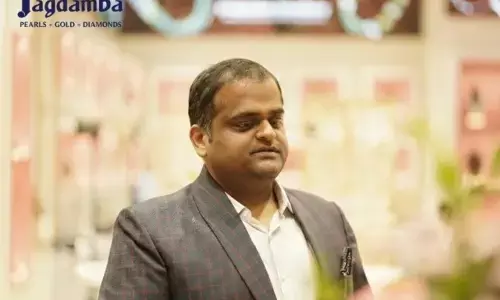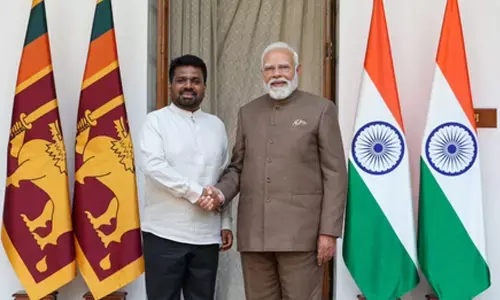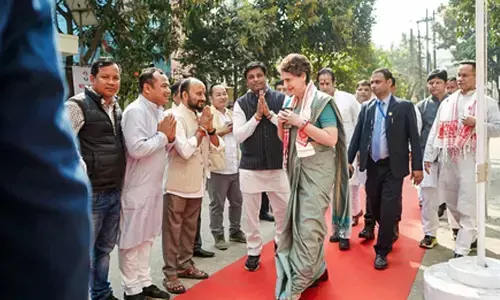Reassessing Nehru

Nehru, the first Prime Minister of independent India, is the representative of the diversities that mark the Indian public scene. His death anniversary (May 27) is the time to examine his perspectives vis-� -vis democracy and press: Two sides of the same coin. Jawaharlal Nehru (14 November 1889- 27 May 1964), architect, builder, visionary, dreamer, democrat, pacifist, statesman, lover of children, roses and controversies. This collage of images of the first Prime Minister of independent India is representative of the unique diversities that mark the Indian public scene. Next week the nation remembers him as the Jewel of India (as Frank Moraes described him at the time of his death). Nehru left behind him legacies that stir irrational emotions and frustrate a dispassionate assessment of his role but it is important to give dispassion a try.  Let us examine his perspectives and performance vis-� -vis democracy and press, two sides of the same coin. He once said, "Democracy is good. I say this because the other systems are worse." Yet when the test came, he chose the other system. According to Kuldip Nayar (Mainstream, June 20, 2009) he dismissed the country's first democratically elected communist government because its Chief Minister EMS Namboodiripad had the gall to oppose Nehru's anti-people plan to extend the life of the Preventive Detention Act (PDA). Under that law a person could be detained merely on suspicion in the mind of the executive authority without trial and without conviction by a court. Nehru's distaste for an alternative system was on display even earlier when his government used police and military power to snuff the Telangana peasant movement against feudal tyranny. The fault of the peasants was they had allowed the communists to lead their struggle. On mere suspicion, people were herded into black marias, taken to the forests of Palvancha and Boorgampahad and shot without trial. Nehru regarded the communists as "Anti-India, anti-people, anti-progress, dazzled by Russia and China, but ignorant of India. They are without moorings in the land of their birth. They are pledged to a policy of creating mental and physical conflicts. They indulge in a cult of disruption." (Time magazine, Dec.13, 1954). Despite the cloying hero worship by the press, the Nehru government's policy on the press was not an undiluted blessing. True, the wage boards for journalists and non-journalists came in his time, compelling the country's press barons to pay fair wages to their employees. The first press commission also took shape when Nehru was at the helm. He understood the role of the press in society and its essentiality for a democracy. He told Parliament (16 May, 1951), ''The press is one of the vital organs of modern life, especially in a democracy. The press has tremendous powers and responsibilities. The press must be respected and it must also have co-operation." However, a mere four days later, he moved the First Amendment to our Constitution that would restrict the freedom of the press. Why did he do it? Tabling the amendment he explained to Parliament (20 May 1951) that certain judicial decisions and pronouncements had created problems for his government. He said, "The citizen's right to freedom of speech and expression has been held by some courts to be so comprehensive as not to render a person culpable even if he advocates murder and other crimes of violence." This was a reference to the statement of a judge in a Patna High Court case. In a case that came up before him, Justice Sarjoo Prasad had said that, "If a person were to go on inciting murder or other cognisable offences either through the press or by word of mouth, he would be free to do so with impunity, because he could claim freedom of speech and expression." Nehru was also rattled by two Supreme Court decisions arriving on the same day, (Romesh Thapar vs. State of Madras and Brij Bbhushan vs. State of Bihar), In the Thapar case, the Government of Madras prohibited in March 1951 "Crossroads," a weekly edited by Romesh Thapar, from entering or circulating in the state. On appeal by Thapar, the Supreme Court held that the ban violated Art. 19 (1) (a) on freedom of expression. In the Brij Bhushan case, a case of prior restraint, the Chief Commissioner of Delhi passed an order against "The Organiser," an RSS mouthpiece, under the East Punjab Public Safety Act, directing the newspaper to submit for scrutiny before publication all articles, news, cartoons, analyses and pictures relating to communal issues or materials with respect to the partition. On appeal, the Supreme Court declared that the Punjab law was unconstitutional. In both cases, the ground for restrictions (public order) was outside the purview of Article 19 (2) that specifies conditions for restricting freedom of expression. One may remember that Thapar was a critic of Nehru's policies and "Organiser" was the mouthpiece of the RSS, which his government had banned following Gandhi's assassination. Nehru argued that restrictions on freedom of expression need not be reasonable because the word was ambiguous and would permit the courts to put their own gloss on whether a particular Act was reasonable or not. The Law Ministry felt that the word 'reasonable' should be retained. The Cabinet Committee, however, felt that while it was reasonable to retain the word 'reasonable' in the other provisions in Art. 19, restrictions on freedom of speech and expression should not be qualified in any manner. In the end, following fierce opposition, Nehru agreed to include the word 'reasonable' to qualify the restrictions on freedom of speech and expression. Parliament passed the bill on 1 June 1951. The Press (Objectionable Matter) Act too came up in the same year. It provided "against the printing and publication of incitement to crime and other objectionable matters." When it lapsed in 1957, the Criminal Law Amendment Act replaced it in 1961 and next year came the Defence of India Act in the context of the war with China. The Newspaper (Price & Page) Act, 1956 Act also came in Nehru's time. It discouraged newspapers from reducing the price to increase circulation. The dismissal of the Namboodiripad government, his distrust of the press and the judiciary and his defence of measures like preventive detentions reveal a disjunct between what he said and what he did. But the common man knew only Nehru, the myth, in making which an obsequious press played no mean role. But the losers, at the end of it all, were the public at large. As always. (The writer is a senior Indian journalist who now lives in the US, [email protected])
Let us examine his perspectives and performance vis-� -vis democracy and press, two sides of the same coin. He once said, "Democracy is good. I say this because the other systems are worse." Yet when the test came, he chose the other system. According to Kuldip Nayar (Mainstream, June 20, 2009) he dismissed the country's first democratically elected communist government because its Chief Minister EMS Namboodiripad had the gall to oppose Nehru's anti-people plan to extend the life of the Preventive Detention Act (PDA). Under that law a person could be detained merely on suspicion in the mind of the executive authority without trial and without conviction by a court. Nehru's distaste for an alternative system was on display even earlier when his government used police and military power to snuff the Telangana peasant movement against feudal tyranny. The fault of the peasants was they had allowed the communists to lead their struggle. On mere suspicion, people were herded into black marias, taken to the forests of Palvancha and Boorgampahad and shot without trial. Nehru regarded the communists as "Anti-India, anti-people, anti-progress, dazzled by Russia and China, but ignorant of India. They are without moorings in the land of their birth. They are pledged to a policy of creating mental and physical conflicts. They indulge in a cult of disruption." (Time magazine, Dec.13, 1954). Despite the cloying hero worship by the press, the Nehru government's policy on the press was not an undiluted blessing. True, the wage boards for journalists and non-journalists came in his time, compelling the country's press barons to pay fair wages to their employees. The first press commission also took shape when Nehru was at the helm. He understood the role of the press in society and its essentiality for a democracy. He told Parliament (16 May, 1951), ''The press is one of the vital organs of modern life, especially in a democracy. The press has tremendous powers and responsibilities. The press must be respected and it must also have co-operation." However, a mere four days later, he moved the First Amendment to our Constitution that would restrict the freedom of the press. Why did he do it? Tabling the amendment he explained to Parliament (20 May 1951) that certain judicial decisions and pronouncements had created problems for his government. He said, "The citizen's right to freedom of speech and expression has been held by some courts to be so comprehensive as not to render a person culpable even if he advocates murder and other crimes of violence." This was a reference to the statement of a judge in a Patna High Court case. In a case that came up before him, Justice Sarjoo Prasad had said that, "If a person were to go on inciting murder or other cognisable offences either through the press or by word of mouth, he would be free to do so with impunity, because he could claim freedom of speech and expression." Nehru was also rattled by two Supreme Court decisions arriving on the same day, (Romesh Thapar vs. State of Madras and Brij Bbhushan vs. State of Bihar), In the Thapar case, the Government of Madras prohibited in March 1951 "Crossroads," a weekly edited by Romesh Thapar, from entering or circulating in the state. On appeal by Thapar, the Supreme Court held that the ban violated Art. 19 (1) (a) on freedom of expression. In the Brij Bhushan case, a case of prior restraint, the Chief Commissioner of Delhi passed an order against "The Organiser," an RSS mouthpiece, under the East Punjab Public Safety Act, directing the newspaper to submit for scrutiny before publication all articles, news, cartoons, analyses and pictures relating to communal issues or materials with respect to the partition. On appeal, the Supreme Court declared that the Punjab law was unconstitutional. In both cases, the ground for restrictions (public order) was outside the purview of Article 19 (2) that specifies conditions for restricting freedom of expression. One may remember that Thapar was a critic of Nehru's policies and "Organiser" was the mouthpiece of the RSS, which his government had banned following Gandhi's assassination. Nehru argued that restrictions on freedom of expression need not be reasonable because the word was ambiguous and would permit the courts to put their own gloss on whether a particular Act was reasonable or not. The Law Ministry felt that the word 'reasonable' should be retained. The Cabinet Committee, however, felt that while it was reasonable to retain the word 'reasonable' in the other provisions in Art. 19, restrictions on freedom of speech and expression should not be qualified in any manner. In the end, following fierce opposition, Nehru agreed to include the word 'reasonable' to qualify the restrictions on freedom of speech and expression. Parliament passed the bill on 1 June 1951. The Press (Objectionable Matter) Act too came up in the same year. It provided "against the printing and publication of incitement to crime and other objectionable matters." When it lapsed in 1957, the Criminal Law Amendment Act replaced it in 1961 and next year came the Defence of India Act in the context of the war with China. The Newspaper (Price & Page) Act, 1956 Act also came in Nehru's time. It discouraged newspapers from reducing the price to increase circulation. The dismissal of the Namboodiripad government, his distrust of the press and the judiciary and his defence of measures like preventive detentions reveal a disjunct between what he said and what he did. But the common man knew only Nehru, the myth, in making which an obsequious press played no mean role. But the losers, at the end of it all, were the public at large. As always. (The writer is a senior Indian journalist who now lives in the US, [email protected])
 Let us examine his perspectives and performance vis-� -vis democracy and press, two sides of the same coin. He once said, "Democracy is good. I say this because the other systems are worse." Yet when the test came, he chose the other system. According to Kuldip Nayar (Mainstream, June 20, 2009) he dismissed the country's first democratically elected communist government because its Chief Minister EMS Namboodiripad had the gall to oppose Nehru's anti-people plan to extend the life of the Preventive Detention Act (PDA). Under that law a person could be detained merely on suspicion in the mind of the executive authority without trial and without conviction by a court. Nehru's distaste for an alternative system was on display even earlier when his government used police and military power to snuff the Telangana peasant movement against feudal tyranny. The fault of the peasants was they had allowed the communists to lead their struggle. On mere suspicion, people were herded into black marias, taken to the forests of Palvancha and Boorgampahad and shot without trial. Nehru regarded the communists as "Anti-India, anti-people, anti-progress, dazzled by Russia and China, but ignorant of India. They are without moorings in the land of their birth. They are pledged to a policy of creating mental and physical conflicts. They indulge in a cult of disruption." (Time magazine, Dec.13, 1954). Despite the cloying hero worship by the press, the Nehru government's policy on the press was not an undiluted blessing. True, the wage boards for journalists and non-journalists came in his time, compelling the country's press barons to pay fair wages to their employees. The first press commission also took shape when Nehru was at the helm. He understood the role of the press in society and its essentiality for a democracy. He told Parliament (16 May, 1951), ''The press is one of the vital organs of modern life, especially in a democracy. The press has tremendous powers and responsibilities. The press must be respected and it must also have co-operation." However, a mere four days later, he moved the First Amendment to our Constitution that would restrict the freedom of the press. Why did he do it? Tabling the amendment he explained to Parliament (20 May 1951) that certain judicial decisions and pronouncements had created problems for his government. He said, "The citizen's right to freedom of speech and expression has been held by some courts to be so comprehensive as not to render a person culpable even if he advocates murder and other crimes of violence." This was a reference to the statement of a judge in a Patna High Court case. In a case that came up before him, Justice Sarjoo Prasad had said that, "If a person were to go on inciting murder or other cognisable offences either through the press or by word of mouth, he would be free to do so with impunity, because he could claim freedom of speech and expression." Nehru was also rattled by two Supreme Court decisions arriving on the same day, (Romesh Thapar vs. State of Madras and Brij Bbhushan vs. State of Bihar), In the Thapar case, the Government of Madras prohibited in March 1951 "Crossroads," a weekly edited by Romesh Thapar, from entering or circulating in the state. On appeal by Thapar, the Supreme Court held that the ban violated Art. 19 (1) (a) on freedom of expression. In the Brij Bhushan case, a case of prior restraint, the Chief Commissioner of Delhi passed an order against "The Organiser," an RSS mouthpiece, under the East Punjab Public Safety Act, directing the newspaper to submit for scrutiny before publication all articles, news, cartoons, analyses and pictures relating to communal issues or materials with respect to the partition. On appeal, the Supreme Court declared that the Punjab law was unconstitutional. In both cases, the ground for restrictions (public order) was outside the purview of Article 19 (2) that specifies conditions for restricting freedom of expression. One may remember that Thapar was a critic of Nehru's policies and "Organiser" was the mouthpiece of the RSS, which his government had banned following Gandhi's assassination. Nehru argued that restrictions on freedom of expression need not be reasonable because the word was ambiguous and would permit the courts to put their own gloss on whether a particular Act was reasonable or not. The Law Ministry felt that the word 'reasonable' should be retained. The Cabinet Committee, however, felt that while it was reasonable to retain the word 'reasonable' in the other provisions in Art. 19, restrictions on freedom of speech and expression should not be qualified in any manner. In the end, following fierce opposition, Nehru agreed to include the word 'reasonable' to qualify the restrictions on freedom of speech and expression. Parliament passed the bill on 1 June 1951. The Press (Objectionable Matter) Act too came up in the same year. It provided "against the printing and publication of incitement to crime and other objectionable matters." When it lapsed in 1957, the Criminal Law Amendment Act replaced it in 1961 and next year came the Defence of India Act in the context of the war with China. The Newspaper (Price & Page) Act, 1956 Act also came in Nehru's time. It discouraged newspapers from reducing the price to increase circulation. The dismissal of the Namboodiripad government, his distrust of the press and the judiciary and his defence of measures like preventive detentions reveal a disjunct between what he said and what he did. But the common man knew only Nehru, the myth, in making which an obsequious press played no mean role. But the losers, at the end of it all, were the public at large. As always. (The writer is a senior Indian journalist who now lives in the US, [email protected])
Let us examine his perspectives and performance vis-� -vis democracy and press, two sides of the same coin. He once said, "Democracy is good. I say this because the other systems are worse." Yet when the test came, he chose the other system. According to Kuldip Nayar (Mainstream, June 20, 2009) he dismissed the country's first democratically elected communist government because its Chief Minister EMS Namboodiripad had the gall to oppose Nehru's anti-people plan to extend the life of the Preventive Detention Act (PDA). Under that law a person could be detained merely on suspicion in the mind of the executive authority without trial and without conviction by a court. Nehru's distaste for an alternative system was on display even earlier when his government used police and military power to snuff the Telangana peasant movement against feudal tyranny. The fault of the peasants was they had allowed the communists to lead their struggle. On mere suspicion, people were herded into black marias, taken to the forests of Palvancha and Boorgampahad and shot without trial. Nehru regarded the communists as "Anti-India, anti-people, anti-progress, dazzled by Russia and China, but ignorant of India. They are without moorings in the land of their birth. They are pledged to a policy of creating mental and physical conflicts. They indulge in a cult of disruption." (Time magazine, Dec.13, 1954). Despite the cloying hero worship by the press, the Nehru government's policy on the press was not an undiluted blessing. True, the wage boards for journalists and non-journalists came in his time, compelling the country's press barons to pay fair wages to their employees. The first press commission also took shape when Nehru was at the helm. He understood the role of the press in society and its essentiality for a democracy. He told Parliament (16 May, 1951), ''The press is one of the vital organs of modern life, especially in a democracy. The press has tremendous powers and responsibilities. The press must be respected and it must also have co-operation." However, a mere four days later, he moved the First Amendment to our Constitution that would restrict the freedom of the press. Why did he do it? Tabling the amendment he explained to Parliament (20 May 1951) that certain judicial decisions and pronouncements had created problems for his government. He said, "The citizen's right to freedom of speech and expression has been held by some courts to be so comprehensive as not to render a person culpable even if he advocates murder and other crimes of violence." This was a reference to the statement of a judge in a Patna High Court case. In a case that came up before him, Justice Sarjoo Prasad had said that, "If a person were to go on inciting murder or other cognisable offences either through the press or by word of mouth, he would be free to do so with impunity, because he could claim freedom of speech and expression." Nehru was also rattled by two Supreme Court decisions arriving on the same day, (Romesh Thapar vs. State of Madras and Brij Bbhushan vs. State of Bihar), In the Thapar case, the Government of Madras prohibited in March 1951 "Crossroads," a weekly edited by Romesh Thapar, from entering or circulating in the state. On appeal by Thapar, the Supreme Court held that the ban violated Art. 19 (1) (a) on freedom of expression. In the Brij Bhushan case, a case of prior restraint, the Chief Commissioner of Delhi passed an order against "The Organiser," an RSS mouthpiece, under the East Punjab Public Safety Act, directing the newspaper to submit for scrutiny before publication all articles, news, cartoons, analyses and pictures relating to communal issues or materials with respect to the partition. On appeal, the Supreme Court declared that the Punjab law was unconstitutional. In both cases, the ground for restrictions (public order) was outside the purview of Article 19 (2) that specifies conditions for restricting freedom of expression. One may remember that Thapar was a critic of Nehru's policies and "Organiser" was the mouthpiece of the RSS, which his government had banned following Gandhi's assassination. Nehru argued that restrictions on freedom of expression need not be reasonable because the word was ambiguous and would permit the courts to put their own gloss on whether a particular Act was reasonable or not. The Law Ministry felt that the word 'reasonable' should be retained. The Cabinet Committee, however, felt that while it was reasonable to retain the word 'reasonable' in the other provisions in Art. 19, restrictions on freedom of speech and expression should not be qualified in any manner. In the end, following fierce opposition, Nehru agreed to include the word 'reasonable' to qualify the restrictions on freedom of speech and expression. Parliament passed the bill on 1 June 1951. The Press (Objectionable Matter) Act too came up in the same year. It provided "against the printing and publication of incitement to crime and other objectionable matters." When it lapsed in 1957, the Criminal Law Amendment Act replaced it in 1961 and next year came the Defence of India Act in the context of the war with China. The Newspaper (Price & Page) Act, 1956 Act also came in Nehru's time. It discouraged newspapers from reducing the price to increase circulation. The dismissal of the Namboodiripad government, his distrust of the press and the judiciary and his defence of measures like preventive detentions reveal a disjunct between what he said and what he did. But the common man knew only Nehru, the myth, in making which an obsequious press played no mean role. But the losers, at the end of it all, were the public at large. As always. (The writer is a senior Indian journalist who now lives in the US, [email protected])Next Story









